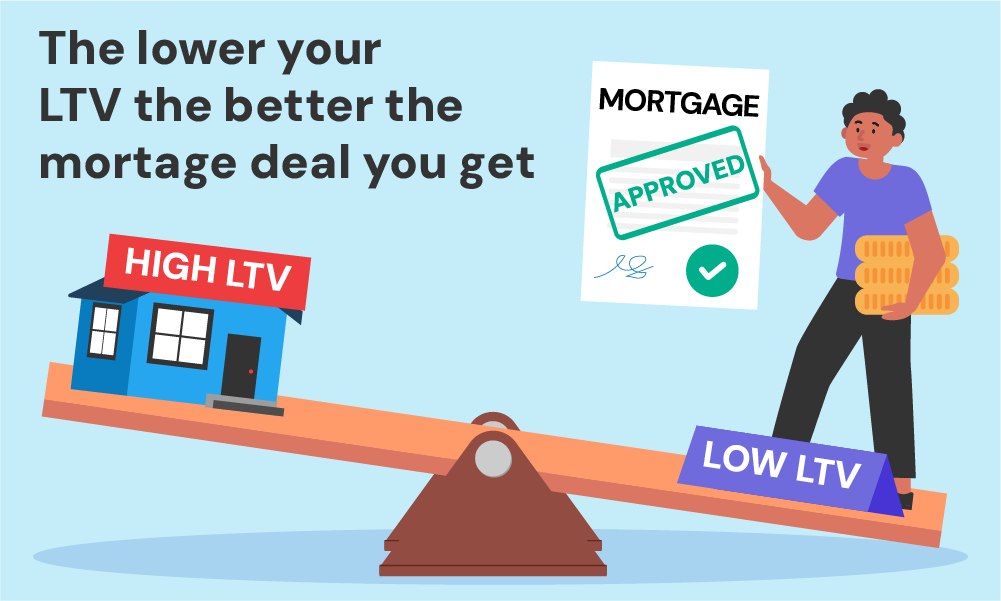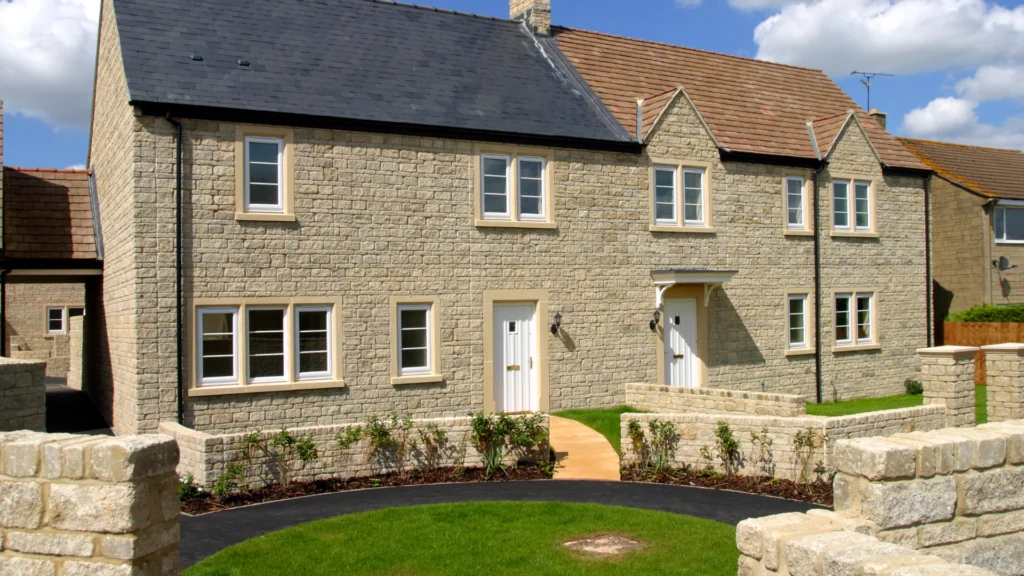- How Much Are £400,000 Mortgage Repayments?
- What Factors Affect £400,000 Mortgage Repayments?
- How Much Do You Need to Earn to Afford a £400k Mortgage?
- How Much Deposit Do You Need for a £400,000 Mortgage?
- How to Get the Best Deal on Your £400,000 Mortgage
- What Are the Different Mortgage Types Available for £400,000?
- Other Costs to Consider With a £400k Mortgage
- Key Takeaways
- The Bottom Line
How Much Will £400,000 Mortgage Repayments Cost You?

Getting a mortgage is a huge financial decision, so it’s important to understand what you’re getting into.
A £400,000 mortgage might seem overwhelming, but don’t worry—we’re here to make it simple.
Knowing your monthly repayments, interest rates, and options will help you feel more in control and confident about your choices.
In this guide, we’ll show you what you might pay each month for a £400,000 mortgage. We’ll look at interest rates, term lengths, deposit sizes, and repayment types.
Whether you’re wondering how to get the best deal or just want to know, “How much is a £400,000 mortgage per month in the UK?”—we’ve got you covered.
How Much Are £400,000 Mortgage Repayments?
In simple terms, £400,000 mortgage repayments depend on a few factors: the mortgage term, the interest rate, and the repayment type you go for.
The most common term is 25 years, and for a 400,000 mortgage over 25 years, the average monthly repayment would typically be around £2,111 to £2,338, depending on the interest rate.
But don’t worry, we’ll break it all down.
The interest rate is a major player here. With rates sitting around 4.5% to 5.5% (as of right now), monthly payments on a 400k mortgage are likely to hover in that £2,100 to £2,300 range.
If you manage to get a lower rate, great news! That means lower repayments and more cash for the fun stuff—or the bills that come with owning a home.
Here’s a handy table that breaks down the numbers, showing what you’d pay each month depending on the interest rate and the mortgage term.
| Mortgage Terms | 2% | 3% Rate | 4% Rate | 5% Rate | 6% Rate | 7% Rate |
|---|---|---|---|---|---|---|
| 5 Years | £7,031 | £7,188 | £7,345 | £7,504 | £7,663 | £7,823 |
| 10 Years | £3,682 | £3,859 | £4,048 | £4,246 | £4,453 | £4,668 |
| 15 Years | £2,579 | £2,762 | £2,957 | £3,163 | £3,378 | £3,603 |
| 20 Years | £2,025 | £2,218 | £2,424 | £2,640 | £2,866 | £3,101 |
| 25 Years | £1,694 | £1,897 | £2,111 | £2,338 | £2,577 | £2,827 |
| 30 Years | £1,478 | £1,686 | £1,910 | £2,147 | £2,398 | £2,661 |
This table shows the monthly payments for a repayment mortgage, which pays off both the interest and the principal over time.
For an interest-only mortgage, you only pay the interest each month. Here’s how much you’d pay based on the interest rate:
- 2% Interest: £667 per month
- 3% Interest: £1,000 per month
- 4% Interest: £1,333 per month
- 5% Interest: £1,667 per month
- 6% Interest: £2,000 per month
- 7% Interest: £2,333 per month
If you want to see how different rates and terms affect your monthly payments, try using a mortgage calculator.
It can help you find the best option for your budget and give you a better idea of what to expect—go ahead and give it a try.
What Factors Affect £400,000 Mortgage Repayments?
Let’s talk about what can make your payment on a £400,000 mortgage higher or lower.
After all, it’s not a one-size-fits-all deal, and a few things can sway your monthly repayment.
Here’s what affects your mortgage repayments:
Mortgage Term
Longer terms mean lower monthly repayments but higher overall costs in the long run due to all that extra interest.
If you go for a shorter term, say 15 years, your monthly payments will be higher, but you’ll pay off the mortgage faster—and save a heap in interest.
“Which one’s best for me?” you ask, well, it all boils down to your finances.
If you’re comfortable with a higher monthly payment, go for a shorter term. Imagine being mortgage-free in just a few years—sounds nice, doesn’t it?
But if your budget’s a bit tighter with other bills and priorities, a longer term could be the better fit.
Still not sure? That’s totally okay! Having a chat with a good mortgage broker can help you see the options laid out clearly, so you can find the right path forward for you and your budget.
Interest Rate
Higher rates mean higher monthly repayments—pretty straightforward. If you’re getting a mortgage while rates are up, you might want to fix it for a few years and ride out any market changes.
Alternatively, you could opt for a variable rate and hope it comes down. We’ll go over these types later on in this article.
Deposit Size
The more you put down upfront, the less you’ll need to borrow—and that can lead to lower interest rates.
Lenders prefer bigger deposits because they reduce their risk, so they’re more likely to offer better rates if you have, say, a 25% deposit.
And here’s where Loan-to-Value (LTV) comes in: it’s the percentage of the property’s value you’re borrowing.
A lower LTV generally means better rates. So, if you’re able to save up a larger deposit, you’ll likely save on interest over the long run.

Repayment Type
You’ve got two choices here—capital repayment or interest-only.
Capital repayment means you’re chipping away at the £400,000 mortgage amount each month, plus the interest.
With interest-only, you’re just covering the interest, which means lower monthly payments, but you’ll need to pay the £400k off in one lump sum at the end of the term.
That might suit some, but it’s not for everyone.
How Much Do You Need to Earn to Afford a £400k Mortgage?
To be in the running for a 400,000 mortgage, most lenders require that you earn around 4 to 4.5 times the mortgage amount.
So, to keep the maths simple, for a 400,000 mortgage, you’ll need an annual salary somewhere between £88,888 and £100,000.
If that’s sounding a bit steep, don’t worry. There are ways around it.
If you’re applying as a couple, you can combine your incomes, which could make getting approved a lot more likely.
Some lenders might even stretch to 5 or 6 times your salary, especially if you’re in a high-income, stable profession—think doctor or solicitor.
>> More about Income Multiples
How Much Deposit Do You Need for a £400,000 Mortgage?
As we’ve mentioned, the bigger the deposit, the better. Most lenders will expect at least 5% to 10% for a 400,000 mortgage.
That means you’ll need between £20,000 and £40,000 to get your foot in the door. But if you can save up more, that’s even better—you could secure a lower interest rate and pay less each month.
For those with credit issues or looking to buy a property that’s a bit out of the ordinary—like a thatched cottage in the countryside—a bigger deposit of around 20% or more may be required.
So, it’s worth getting a clear picture of your deposit goals early on.
How to Get the Best Deal on Your £400,000 Mortgage
It’s always a good idea to chat with a whole-of-market mortgage broker when you’re trying to get the best deal.
A whole-of-market broker has access to the entire market and can often secure exclusive rates that you wouldn’t be able to get if you went directly to a lender.
Plus, they do all the legwork for you—meaning less stress and more time for important things, like deciding on paint colours for the new place.
They’ll also help with affordability checks, deposit requirements, and gathering all the paperwork. It’s not exactly the glamorous part of buying a house, but it’s important.
Having everything ready means you can speed through the application process and avoid any hiccups.

What Are the Different Mortgage Types Available for £400,000?
So, what’s the deal with mortgage types? Here’s a quick rundown:
- Fixed-Rate Mortgages – These keep your repayments steady for a set period (usually 2-5 years). It’s great for anyone who wants peace of mind and likes predictability in your budgeting.
- Variable-Rate Mortgages – Your rates can go up or down depending on market conditions. This includes tracker mortgages, which follow the Bank of England’s base rate, but here’s the catch—they don’t follow it exactly. Lenders often add a little extra percentage on top, so if the base rate is 2%, your rate might be 2.5% or 3%, depending on the lender. It’s a bit riskier since rates can change, but if the rate drops, you could end up paying less each month.
Other Costs to Consider With a £400k Mortgage
Buying a home isn’t just about the mortgage payments. There are a few extra costs to budget for, including:
- Product Fees. Some mortgages come with set-up fees, ranging anywhere from £500 to £2,000. You might have the option to add these fees to your mortgage, but remember, that means you’ll be paying interest on them, too—so it could cost you more in the long run.
- Valuation Fees. Before handing over the cash, your lender will want to check the property’s value to ensure it’s worth the price you’re paying. This valuation usually costs around £300, but some lenders may offer it for free with certain deals.
- Solicitors’ Fees. Conveyancing fees can add up, and you’re likely looking at £800 to £1,500 for your solicitor to handle the legal bits. They’ll take care of everything from contracts to property searches and any other essential paperwork.
- Insurance. To protect your new home, you’ll need buildings insurance—most lenders make this a requirement. It’s also a good idea to look into life insurance, which can cover the mortgage in case something happens to you. And, if you want an extra layer of security, consider income protection insurance to cover your payments if you’re ever unable to work.
There are a few other costs to consider, like moving expenses or even stamp duty, depending on the property. It all adds up, but with a bit of planning, you can budget for these extra bits and keep things on track.
Key Takeaways
- Monthly repayments on a £400,000 mortgage depend on the term length, interest rate, and repayment type. For a 25-year term, expect payments between £2,111 and £2,338.
- To qualify for a £400,000 mortgage, you’ll need an annual income between £88,888 and £100,000, or a combined income for joint applications.
- A deposit of 5-10% (£20,000 – £40,000) is required, but larger deposits help lower interest rates and monthly repayments.
- Fixed, variable, and interest-only mortgages all impact how much you pay each month—each has pros and cons.
- Additional costs include product fees, valuation fees, legal fees, and insurance—make sure to budget for these.
The Bottom Line
If you’ve made it this far, you’re probably still wondering if a £400,000 mortgage is the right move for you.
Knowing the basics, like monthly repayments, required income, and deposit size, can give you a clearer picture of what to expect and help you plan accordingly.
If you’re not sure where to start, a mortgage broker can help. Here’s how:
- They can find exclusive deals and lower rates you may not find on your own.
- They help simplify the application process by handling all the paperwork.
- They offer personalised advice to match your needs, saving you time and effort.
Get in touch with us to connect with a good mortgage broker who can help you find the best mortgage deal for you.
Get Matched With Your Dream Mortgage Advisor...

Frequently asked questions
Is it better to go for a fixed or variable rate mortgage?
It depends on your circumstances. Fixed rates give stability with set monthly payments, while variable rates can fluctuate—sometimes saving you money, sometimes costing more.
Does having a bad credit score means you can’t get a bigger mortgage?
Not always. A bad credit score can make it harder to get a mortgage and might mean you get a higher interest rate. But it doesn’t mean you’re completely out of luck.
Lenders will look at things like your income, how much money you have for a deposit, and your overall finances.
In some cases, a mortgage broker can help you find lenders who are more willing to work with people who have bad credit.
This means you might still be able to get the mortgage you need, even if your credit score isn’t perfect.
How much mortgage do I need to buy a house worth £400,000 in the UK?
The mortgage you’ll need depends on your deposit size. For a £400,000 house, if you have a 10% deposit (£40,000), you’ll need a mortgage for the remaining £360,000.
With a 20% deposit (£80,000), you’d need £320,000, and so on. Most lenders require at least a 5% deposit, which means borrowing £380,000.
Generally, the bigger your deposit, the less you’ll need to borrow, which can help you get better rates and lower monthly payments.
To find the best fit for your budget, it’s worth speaking with a mortgage advisor who can walk you through your options.




